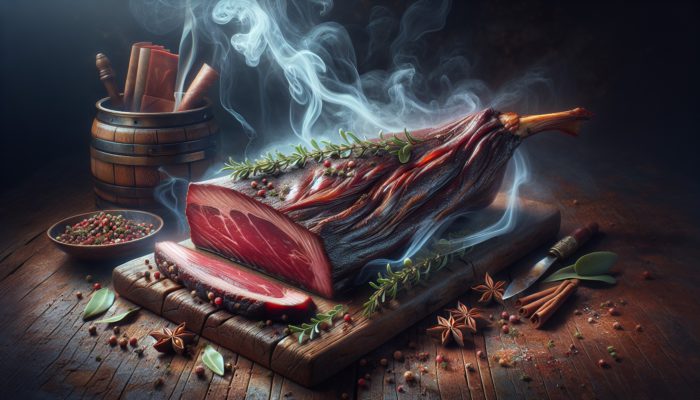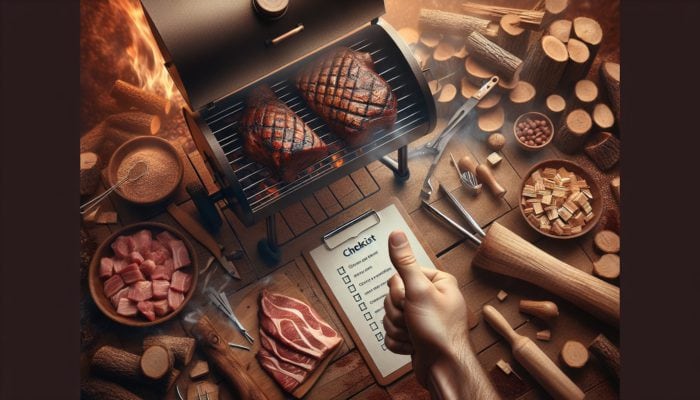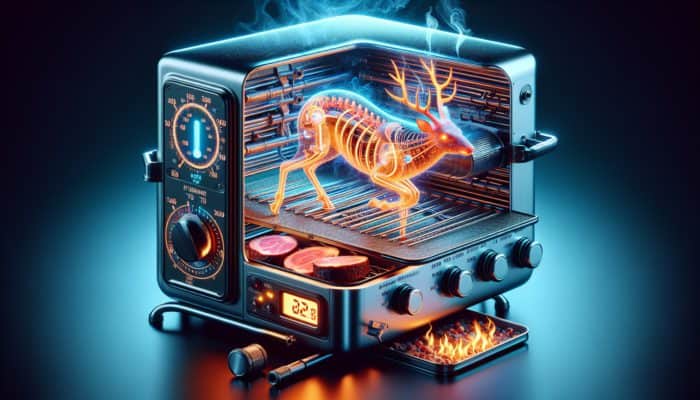Mastering the Art of Choosing the Perfect Venison Cut for Smoking
Discovering the Most Flavorful Cuts for Smoking Venison

Embarking on the exciting journey of how to smoke venison without drying it requires a deep understanding of the crucial role that selecting the right cut plays in achieving optimal outcomes. Cuts such as the hindquarter and backstrap are not just popular for their rich flavors; they also possess the necessary structural integrity to withstand the smoking process effectively. The backstrap, also referred to as the tenderloin, is highly prized for its unparalleled tenderness and robust flavor. By carefully choosing cuts that retain moisture, you lay the groundwork for a successful and flavor-packed smoking experience that will impress even the most discerning palates.
In addition to the backstrap, the hindquarter is another exceptional choice, offering a well-balanced combination of meat and fat that is vital for moisture retention during cooking. Seek out cuts that exhibit good marbling; the intramuscular fat will melt during the smoking process, basting the meat from within and ensuring a juicy, succulent end product. For those in the United States, finding these desired cuts should be relatively straightforward, as they are typically available at local butcher shops and grocery stores, especially in regions with a rich hunting heritage.
Understanding Fat Content in Venison for Optimal Smoking Success
The reputation of venison is built on its leanness, which can pose challenges during the smoking process. To successfully master how to smoke venison without drying it out, it’s imperative to grasp the significance of the fat content within your chosen cut. Selecting cuts that contain a higher fat content can dramatically improve your smoking results. Cuts from the shoulder area, for instance, tend to have more fat, which plays a vital role in keeping the meat moist throughout the lengthy smoking procedure.
Although lean cuts like the backstrap are undeniably delicious, they require meticulous attention to detail when it comes to moisture retention practices. Pairing these lean cuts with a robust marinade or brine can effectively counterbalance their low-fat content, enhancing both flavor and moisture retention. Think of fat as a natural flavor enhancer; even a small amount can ensure that your venison remains juicy, flavorful, and far from dry, leading to a delightful culinary experience.
Ready to Dive Deeper?
Key Preparatory Steps for Your Venison Cut
Preparation is a fundamental aspect of becoming adept at smoking venison without drying it. Begin the process by meticulously trimming any excess fat and silver skin from the cut. This step not only enhances the overall flavor but also allows your marinade or brine to permeate the meat more effectively. Many home cooks often overlook this critical step; eliminating the silver skin can significantly elevate the eating experience by making the meat more enjoyable and tender.
Moreover, marinating your venison is an equally crucial step that should never be neglected. A thoughtfully crafted marinade, featuring aromatic olive oil, tangy vinegar, and your choice of herbs and spices, can infuse layers of flavor while simultaneously promoting moisture retention. For example, consider using a marinade that blends garlic, rosemary, and a splash of red wine to elevate your venison to extraordinary heights. Allow the meat to marinate for at least a few hours, but ideally overnight, to maximize flavor absorption and achieve the best results possible.
Optimizing Your Smoker Setup for Perfect Results

Maintaining the Perfect Smoking Temperature for Tender Venison
A key technique in mastering how to smoke venison without drying it lies in sustaining the correct temperature throughout the smoking process. A low, consistent temperature of around 225°F is essential for slowly cooking the venison, promoting even cooking while facilitating the breakdown of connective tissues. This results in tender meat that retains its natural juices and flavor.
It's important to understand that fluctuations in temperature can lead to uneven cooking, which can ultimately make the venison dry. Investing in a high-quality thermometer is a wise choice to monitor the smoker’s internal temperature effectively. While many smokers come equipped with built-in thermometers, for greater accuracy, consider using a dual-probe thermometer that allows you to track both the smoker temperature and the meat temperature simultaneously for the best results.
In colder regions of the United States, outdoor temperatures can significantly affect the internal environment of your smoker. Be attentive to the weather conditions and adjust your smoking times accordingly. Remember, the overarching goal is to take your time; slow and steady truly wins the race in the pursuit of the perfect smoked venison!
Choosing the Right Wood to Enhance Venison Flavor
Selecting the appropriate wood is a fundamental element in learning how to smoke venison without drying it. Various types of wood impart distinct flavor profiles, and for venison, a milder smoke is often preferred to enhance rather than overpower its natural taste. Fruit woods like apple and cherry are excellent choices, as they provide a subtle sweetness that complements the gamey flavor of venison wonderfully.
Avoid using stronger woods, such as hickory or mesquite, which can overwhelm the delicate flavor of the meat. Instead, think about experimenting with blends, such as combining apple and oak for a sophisticated flavor profile. The key is to start with smaller amounts of wood and gradually increase them as you become more familiar with the flavor profiles and preferences.
Moreover, the moisture content of the wood chips you use is crucial. Soaking your wood chips in water for at least 30 minutes before adding them to the smoker can facilitate a cleaner, more flavorful smoke. This technique also helps maintain the overall moisture level within your smoking environment, contributing to the juiciness of your venison.
Ensuring Steady Heat for Consistent Smoking Results

Consistency is crucial when it comes to smoking venison. To ensure that your efforts in smoking venison yield delicious results without drying it out, it’s vital to maintain steady heat throughout the process. Many smokers are designed with adjustable vents that can aid in regulating airflow and temperature. Understanding how to operate these vents can significantly enhance your smoking experience.
A good practice is to monitor the heat levels regularly, particularly during the initial hour of smoking when temperature fluctuations can be most pronounced. Additionally, consider keeping a log of your smoking sessions, documenting the outside temperature, wind conditions, and how your smoker responded. This detailed record can guide you in adjusting your approach for optimal results in future smoking endeavors.
Incorporating a water pan into your smoker can also help maintain consistent heat. By introducing moisture into the cooking environment, you not only regulate the temperature but also keep your venison juicy throughout the smoking process, leading to enhanced flavor and texture.
Perfecting Smoke Levels for an Exceptional Flavor Experience
The level of smoke is a vital factor in perfecting your venison smoking techniques. To achieve the best flavor without overwhelming the meat, it’s essential to monitor smoke levels closely. Aim for thin, blue smoke, which indicates that the wood is burning cleanly, producing a more aromatic quality and less bitterness.
If the smoke becomes thick and white, it usually signifies that the wood is smoldering instead of burning, which can lead to undesirable flavors. To prevent this, adjust the air vents on your smoker to increase airflow, allowing for the dissipation of excess smoke and maintaining a clean, enjoyable flavor profile.
Experimenting with your smoking techniques will help you discover the perfect balance for your palate. Every cut of venison and type of wood will create a unique flavor profile. Learning to monitor and adjust smoke levels will elevate your venison smoking skills to new heights of culinary excellence.
Preparing Smoker Grates for Optimal Cooking Performance
Before placing your venison into the smoker, it’s crucial to adequately prepare the smoker surface. Thoroughly cleaning and oiling the grates will help prevent sticking, which can result in tearing when you attempt to remove the meat later on. A clean surface also promotes even cooking, allowing your venison to develop a beautifully crusty exterior.
Select a high-smoke-point oil, such as canola or grapeseed, to lightly coat the grates. This not only helps prevent sticking but contributes to achieving a better sear on the meat. Be sure to clean the grates after each use, removing any residue that could impart undesirable flavors in future smoking sessions, thus ensuring a consistently high-quality outcome.
Taking the time to adequately prepare your smoker creates an optimal cooking environment, which significantly impacts the quality of your venison. Proper maintenance will also extend the lifespan of your smoker, allowing you to enjoy perfectly smoked venison for many seasons to come.
Elevating Flavor Through Brining and Marinating Techniques
Creating a Flavor-Infused Brine for Optimal Results
Brining is a transformative technique that plays a pivotal role in mastering how to smoke venison without drying it. A simple brine made up of salt, sugar, and water can dramatically enhance the moisture content and flavor profile of your meat. The salt in the brine acts to break down muscle proteins, allowing the meat to absorb both water and seasoning more effectively, which is critical for achieving juicy results.
To create an effective brine, combine water, kosher salt, and sugar in a large container. The typical ratio is about 1 cup of salt and 1 cup of sugar for every gallon of water. Feel free to experiment by incorporating spices, herbs, or even fruit juices to add an extra layer of flavor. For example, adding crushed garlic, black peppercorns, or citrus zest can elevate your brine to an entirely new level, providing a more complex flavor experience.
Once your brine is prepared, fully submerge the venison and refrigerate it for at least 12 hours. This allows the flavors to penetrate deeply, resulting in a juicy, flavorful outcome. After the brining process, be sure to rinse the meat thoroughly to eliminate excess salt, ensuring a perfectly balanced flavor profile that captivates the palate.
Marinating for Maximum Flavor and Moisture Retention
Marinating is another essential technique in your culinary repertoire when it comes to smoking venison without drying it. A high-quality marinade not only infuses the meat with flavor but also aids in retaining moisture throughout the smoking process. A basic marinade typically consists of oil, vinegar, and an array of herbs and spices tailored to your preferences.
Using oil as a base creates a protective barrier around the meat, preventing moisture loss while enhancing flavor. For example, an olive oil-based marinade combined with balsamic vinegar, garlic, and fresh rosemary can produce a delightful infusion that elevates the venison's natural flavors. Allow the venison to marinate for a few hours or overnight to maximize flavor absorption and ensure the best results.
Don’t hesitate to explore various flavor profiles; for instance, a marinade featuring soy sauce, ginger, and sesame oil can provide a unique twist that surprises and delights your taste buds. The beauty of marinating is in its creative potential, allowing you to craft unique combinations that yield delicious results every time.
Timing and Temperature Considerations for Effective Brining
When brining venison, timing is critical to ensure maximum moisture retention and flavor. Ideally, allow the brine to permeate the meat for a minimum of 12 hours, but avoid exceeding 24 hours to prevent overly salty results. This timeframe allows the meat to absorb sufficient liquid without compromising its flavor profile and overall quality.
Temperature is equally significant. Always brine in the refrigerator to protect against bacterial growth. A cold environment also aids in the effective absorption of the brine by the meat. If you’re pressed for time, consider cutting the meat into smaller portions, which can expedite the brining process without sacrificing flavor or moisture retention.
After the brining period, remember to rinse the venison thoroughly to remove any excess salt. This step is vital in achieving a balanced flavor, ensuring that your smoked venison is as delicious as possible and ready to impress.
Advanced Smoking Techniques for Impeccable Results
Utilizing a Water Pan for Enhanced Moisture Control
Incorporating a water pan during the smoking process is an invaluable technique for ensuring your venison remains succulent and juicy. During smoking, heat can often draw moisture out of the meat, leading to dryness. By using a water pan, you can add humidity to the smoker, creating a more forgiving cooking environment that helps maintain moisture throughout the process.
Simply place a shallow pan filled with water beneath the grates of the smoker. As the water heats, it will evaporate, generating steam that envelops the meat. This not only keeps the venison moist but also assists in regulating the cooking temperature, ensuring even heat distribution throughout the smoking process.
For an extra flavor boost, consider infusing the water with herbs, citrus, or even beer. This addition can impart subtle flavors to the meat as it cooks, enhancing the overall taste profile. The moisture from the water pan could even contribute to achieving that coveted smoke ring that many pitmasters strive for, elevating your dish to new levels.
Monitoring Internal Temperature for Perfect Doneness
A critical factor in mastering how to smoke venison without drying it is the close monitoring of the internal temperature of the meat. Utilizing a dependable meat thermometer ensures that your venison reaches the optimal temperature for both tenderness and juiciness. For a medium-rare finish, aim for an internal temperature of around 140°F for the best results.
Insert your thermometer into the thickest part of the cut, avoiding any bones or fatty areas to obtain an accurate reading. Cooking venison to the correct temperature not only enhances flavor but also ensures food safety, making it essential to get it right for a delicious meal.
Additionally, remember that venison continues to cook even after it’s removed from the smoker due to residual heat, a phenomenon known as carryover cooking. To prevent overcooking, consider removing it from the smoker when it’s about 5°F below your target temperature. Allow it to rest for several minutes before slicing to enable the juices to redistribute, resulting in tender, juicy, and flavorful meat.
Gradually Applying Smoke for Balanced Flavor Development
The gradual application of smoke is another crucial element in achieving perfectly smoked venison. Beginning with a light smoke and progressively increasing it is the most effective approach for enhancing flavor without overwhelming the meat.
During the initial smoking phase, consider using a small amount of wood chips. Allow the chips to smolder gently, producing a thin blue smoke. This will infuse the meat with flavor while avoiding the bitterness associated with thick, white smoke that can detract from the experience.
As the smoking process continues, you can gradually add more wood chips. Regularly check the smoke level and adjust as needed to ensure a consistent supply of flavor without overpowering the delicate taste of the venison. This technique not only maximizes flavor but also enhances the overall quality of your smoked venison.
Resting and Slicing for Peak Flavor Experience
The Critical Importance of Allowing Venison to Rest
Resting your smoked venison is a critical step that is often overlooked but can greatly affect the outcome. After removing the meat from the smoker, allow it to rest for at least 10 minutes. This crucial process enables the juices to redistribute within the meat, resulting in a more flavorful and tender cut that will truly delight your taste buds.
If you slice into the venison too soon, the juices will escape, leading to a dry texture that detracts from the overall enjoyment. A good rule of thumb is to cover the meat loosely with aluminum foil to keep it warm during the resting period. This simple step can significantly enhance the flavor and moisture of your smoked venison, resulting in a more satisfying and enjoyable meal.
Beyond just enhancing flavor, resting also improves the overall eating experience. Well-rested slices of venison are not only juicier but also more tender, making for a delightful meal that showcases your impressive smoking skills and culinary expertise.
Mastering the Technique of Slicing Against the Grain for Tenderness
When it comes to serving your perfectly smoked venison, the technique of slicing can significantly impact the overall enjoyment of the dish. Always cut against the grain of the meat to ensure that each slice is tender and easy to chew. Slicing with the grain can result in a chewier texture, which can detract from the overall satisfaction of your dish.
To determine the direction of the grain, examine the lines in the meat and position your knife perpendicular to them. This technique ensures that each slice retains its flavor and is easy to chew, thereby enhancing the overall dining experience and making it more enjoyable for you and your guests.
Consider serving the venison alongside accompaniments that complement its rich flavor. Roasted seasonal vegetables or a fresh salad can provide a delightful contrast and balance to the meal. Presentation is equally important; arrange the slices neatly on a platter, perhaps garnished with fresh herbs for an elegant touch that will impress your guests and elevate your dining experience.
Creative Serving Suggestions for Smoked Venison
When it comes to serving your smoked venison, the possibilities are as varied as they are delicious. A fantastic way to complement the rich flavor of smoked venison is to pair it with grilled vegetables. Seasonal options, such as asparagus, bell peppers, and zucchini, can be lightly seasoned and grilled to perfection, providing a fresh contrast to the robust flavor of the meat.
Another wonderful option is to serve your venison with a vibrant salad. A mix of greens, nuts, and fruits can introduce a refreshing element to the dish. Consider adding sliced apples or pears, along with candied pecans and a light vinaigrette. The sweetness of the fruit beautifully offsets the savory notes of the venison, creating a well-rounded and satisfying meal that will delight any palate.
Don’t overlook the potential of sauces! A homemade barbecue sauce or a red wine reduction can further elevate the dish. The key is to enhance the flavors without overpowering the venison itself, allowing its natural richness to shine through irresistibly and create an unforgettable dining experience.
Proper Storage and Reheating of Smoked Venison for Future Enjoyment
Essential Techniques for Storing Smoked Venison
After enjoying your delicious smoked venison, proper storage becomes paramount for preserving its flavor and moisture. Store any leftover smoked venison in an airtight container in the refrigerator for up to three days. This method helps maintain the meat's freshness and prevents it from drying out, ensuring it remains enjoyable for future meals.
To further enhance storage, consider wrapping the venison in plastic wrap before placing it in the container. This additional layer of protection can help maintain moisture and prevent exposure to air, which can lead to drying out and flavor loss over time, ensuring your venison is still delightful when you choose to enjoy it later.
In the United States, if you have an abundance of leftovers, freezing is an excellent option for long-term storage. Vacuum-sealed bags are ideal for this purpose, as they eliminate excess air and protect the meat from freezer burn, allowing you to savor your smoked venison for an extended period without compromising its quality.
Reheating Techniques That Keep Venison Moist and Flavorful
Reheating smoked venison can be a delicate process, especially when your goal is to maintain its moisture and flavor. One of the best methods is to gently reheat the venison in a low-temperature oven, ideally set around 250°F. This technique ensures that the meat warms through without further cooking, preserving both flavor and juiciness.
Another effective approach is to wrap the venison in aluminum foil before placing it in the oven. This traps steam and helps retain moisture, preventing the meat from drying out during the reheating process. Alternatively, if you prefer to reheat on a grill, wrapping the venison in foil can achieve similar results while adding a hint of smoky flavor that enhances the overall taste.
Regardless of the reheating method you choose, be sure to keep a close watch on the internal temperature, ensuring it reaches a safe eating temperature without overcooking and losing its delicious qualities. This attention to detail will ensure that every bite remains as delightful as the first.
Freezing Smoked Venison for Long-Term Enjoyment
Freezing smoked venison is an excellent way to prolong its enjoyment beyond the initial smoking day. When properly vacuum-sealed in bags, the venison can retain its quality for several months, allowing you to savor its flavors later without compromising texture or taste. Be sure to label the bags with the date to keep track of freshness and ensure you enjoy it at its best.
For optimal results, slice the venison before freezing. This allows for quicker thawing and makes it easier to incorporate into various dishes later on. Whether you plan to use the leftover smoked venison in soups, tacos, or sandwiches, having it pre-sliced can save you both time and effort in the kitchen while maximizing flavor in every dish.
Thawing Frozen Venison Safely and Effectively
When it comes to thawing frozen smoked venison, patience is essential. The best method is to transfer the vacuum-sealed bag to the refrigerator and allow it to thaw overnight. This gradual process ensures that the meat retains its texture and flavor, preventing any loss of quality during the thawing process.
Avoid quick thawing methods, such as microwaving or leaving the meat at room temperature, as these can lead to uneven thawing and potential bacterial growth. Proper thawing not only preserves the integrity of the venison but also ensures a delicious and safe meal for you and your guests, allowing for a satisfying dining experience.
Creative Ways to Repurpose Leftover Smoked Venison
Leftover smoked venison is incredibly versatile and can be repurposed into a myriad of dishes. Incorporating it into soups, stews, or sandwiches can breathe new life into the remnants of your smoking session. The rich, smoky flavor of the venison can enhance a variety of recipes, transforming simple meals into gourmet experiences that delight the senses.
For instance, consider adding chopped smoked venison to a hearty vegetable soup. The meat will infuse the broth with flavor, creating a delightful, warming dish that is perfect for chilly days. Alternatively, use the venison in a grilled cheese sandwich, paired with sharp cheddar and roasted red peppers for a flavorful twist on a classic favorite that is sure to impress.
The options for utilizing leftover smoked venison are endless, and taking the time to reuse it creatively can lead to satisfying culinary adventures that excite your palate and inspire your cooking endeavors.
Your Questions Answered: Comprehensive FAQs on Smoking Venison
What is the best cut of venison for optimal smoking results?
The most suitable cuts for smoking venison are the hindquarter and backstrap, as they provide the ideal balance of flavor and moisture retention, essential for achieving optimal smoking outcomes.
How long should I brine venison before smoking it?
Brine venison for a minimum of 12 hours, but no longer than 24 hours, to ensure maximum moisture retention without resulting in an overly salty flavor that detracts from the meat's natural qualities.
What type of wood is recommended for smoking venison?
Mild woods such as apple and cherry are perfect for smoking venison, as they enhance the meat's flavor profile without overpowering its natural taste, allowing the venison to shine.
What temperature should I maintain while smoking venison?
Maintain a low smoking temperature of approximately 225°F to gently cook the venison, helping to retain its moisture throughout the entire smoking process for optimal tenderness.
Is it necessary to let my smoked venison rest before serving?
Yes, allowing smoked venison to rest for at least 10 minutes after smoking enables the juices to redistribute within the meat, resulting in a more tender and flavorful cut that enhances the overall dining experience.
Can I freeze smoked venison for later enjoyment?
Absolutely! You can freeze smoked venison in vacuum-sealed bags for several months, allowing you to enjoy it later without sacrificing quality or flavor.
How do I reheat smoked venison without compromising its moisture?
Gently reheat smoked venison in a low-temperature oven set at 250°F, wrapping it in foil to retain moisture and prevent drying out during the reheating process.
Is marinating venison before smoking a good idea?
Definitely! Marinating venison enhances its flavor and moisture retention, making it a crucial step in the smoking process for achieving optimal results and a delicious meal.
What dishes pair well with smoked venison?
Smoked venison pairs beautifully with grilled vegetables, fresh salads, and various sauces, enhancing its rich flavor while creating a balanced and satisfying meal experience for your guests.
How can I prevent my venison from drying out while smoking?
To prevent drying, select cuts with higher fat content, maintain a consistent low temperature, use a water pan, and diligently monitor smoke levels throughout the smoking process for best results.
Connect with us on Facebook for more tips!
The Article How to Smoke Venison Without Drying It: A Comprehensive Guide appeared first on https://pitmastersarsenal.com





Comments are closed